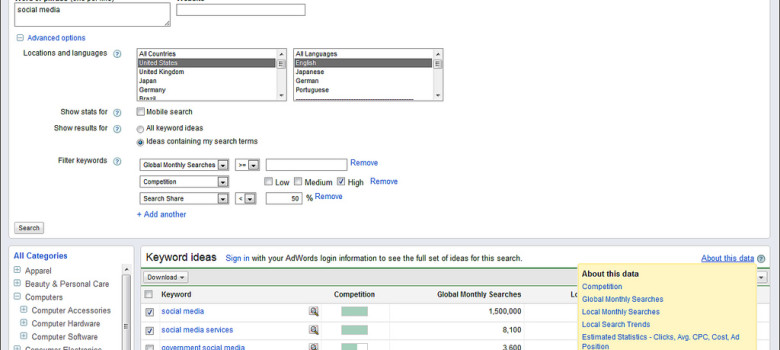The success of Internet giant Google has largely been based on something small: Internet advertising that use tiny keyword-based ads to generate billions of dollars in revenue. Given Google’s massive audience, advertisers have been willing to pay for search-based ads that deliver clicks back to their websites. Those ads appear as sponsored results alongside the organic, relevancy-based search results.
The Google model involves an auction process in which advertisers bid to place their ad against results based on the search terms entered by users. Under the model, whoever is willing to pay the most for a given term or search query has their ad appear as a “sponsored link.” Whenever a user clicks on the sponsored link, the marketer pays Google the bid amount. Each click may only cost a few pennies, but with millions of clicks every day, the keyword advertising business is a multi-billion dollar business.
My weekly technology law column (homepage version) notes that Google’s keyword advertising approach has been a huge commercial success, but it has long raised legal concerns over whether trade mark owners have rights in their marks that extend to their use as keyword advertisements. For example, would it be a trademark violation for Bell Canada to purchase keyword ads using terms such as Telus or Rogers so that its ad would appear alongside search results for the competition?
According to a recent British Columbia court decision, the keyword advertising model is legal and there is little to stop competitors from using the ads to attract users to their websites. The case, which pitted Vancouver Community College against Vancouver Career College, provides advertisers with assurances that an aggressive keyword strategy will not lead to legal liability under Canadian trademark law.
At issue was an online advertising campaign by Vancouver Career College, which purchased ads against terms such as VCC and Vancouver Community College on Google and Yahoo as well as ads using VCC on Facebook and Google Maps. Vancouver Community College argued that the ad campaign constituted “passing off” under trademark law and asked a court to stop it.
The court’s legal analysis focused on whether the ads caused initial interest confusion, which refers to the possibility that consumers would be initially confused about the source of the advertising. If so, there would be a potential claim for passing off, which the courts have ruled “is not in the mere copying of the plaintiff’s goods or symbols; it lies in the representation by the copier that its goods are those of the plaintiff.”
Despite ample evidence that there were consumers confused by the ad campaign (some claimed to have attended the wrong interview or filled out the incorrect paperwork), the court concluded that the ads did not violate the law, reasoning that “the authorities on passing off provide that it is the ‘first impression’ of the searcher at which the potential for confusion arises which may lead to liability. In my opinion, the ‘first impression’ cannot arise on a Google AdWords search at an earlier time than when the searcher reaches a website.”
In other words, the relevant first impression or initial interest does not occur when the ad is displayed. Rather, it happens once the user clicks on the link and arrives at the website. At that stage, there is no attempt to pass off Vancouver Career College as Vancouver Community College. Arriving at the Vancouver Career College may come as a surprise to some users (if they were tricked by the sponsored ad), but the site itself does not pretend to be anything other than the Vancouver Career College.
The decision is a big win for the Vancouver college, which has faced a litany of litigation over its aggressive advertising practices. It is an even bigger victory for Google, however, since it confirms that in Canada trademark holders cannot use the law to stop unwanted keyword advertising.








I have to agree with the courts also, I notice those ads all the time and you still have to be aware of what you are clicking on. That’s not Googles fault if you click on the wrong link. Google has enough to worry about with all the bogus lawsuits it has to defend itself against. Google gives most of it’s services to the consumer for free anyways, it has to make money somehow. We would be alot worse off without google so if that is what the problem is then I would say, so what.
I think you’d have to be pretty naive to consider using ads as a serious resource. Surely someone old enough to go to college isn’t in that category.
If you were thinking of getting a company that offers SEO services, you could be wondering what exactly one of these companies can do for
you.
Whilst they might promise great things for your website, you can also be wondering if their
helps are in reality worthwhile.
However, you need to know that SEO companies offer a great deal of
helpful Search engine optimization which can help your company succeed they’re a few of a lot of things these companies are capable
of doing in your case.
If you require a locksmith in the greater Auckland
location, go to Book a Locksmith to request a single of our locksmiths or just for an thought of cost.
If the locksmith’s on site price tag does not match the telephone estimate, never allow the function to be performed.
SET OF 10 CRIMSON BIRDSLIGHTS CHRISTMASHOLIDAY OUT OF DOORS YARD DECOR NEW
click on image to enlarge.
An enlargement of the thyroid gland, called
a goiter, is sort of all the time current and may appear as a cyst-like or fibrous progress within the neck.
Saiba que eles também são ótimos suplementos no auxílio do emagrecimento.